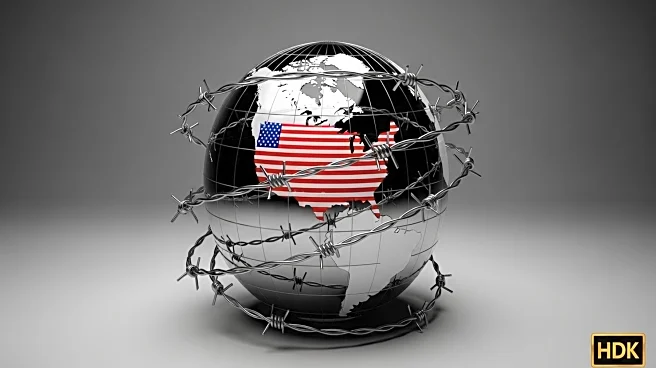What's Happening?
Republican senators are increasing pressure on President Trump to implement new sanctions against Russia following recent violations of Polish airspace by Russian drones. The White House has shown openness to a second phase of sanctions, with North Carolina Senator Thom Tillis expressing concern over Russia's actions and influence. Tillis, co-chair of the Senate NATO Observer Group, highlighted the need for a strong U.S. response to Russia's ongoing aggression in Ukraine. The push for sanctions is supported by a bipartisan package led by Senator Lindsey Graham and Democratic Senator Richard Blumenthal, which proposes significant tariffs on imports from countries purchasing Russian energy resources. Senate Majority Leader John Thune indicated intensified interest in moving forward with the sanctions bill, pending discussions with the White House.
Why It's Important?
The call for new sanctions reflects growing concern among U.S. lawmakers about Russia's military actions and its impact on global stability. Implementing these sanctions could strengthen U.S. foreign policy and demonstrate support for Ukraine amid its conflict with Russia. The proposed sanctions aim to deter Russian aggression by targeting its economic interests, potentially affecting global energy markets and international relations. The bipartisan support for the sanctions package underscores the urgency of addressing Russia's actions and the need for a unified response from the U.S. government. The outcome of this legislative effort could influence U.S.-Russia relations and set a precedent for handling international conflicts.
What's Next?
The Senate is expected to deliberate on the sanctions package, with discussions ongoing between lawmakers and the White House. The administration's decision will likely hinge on diplomatic considerations and the potential impact on U.S. and European economies. If approved, the sanctions could lead to increased tensions with Russia and necessitate further diplomatic engagement. Lawmakers are urging swift action to empower President Trump in negotiations with Russia, emphasizing the need to protect U.S. interests and support NATO allies. The situation remains dynamic, with potential developments in U.S. foreign policy and international relations.









